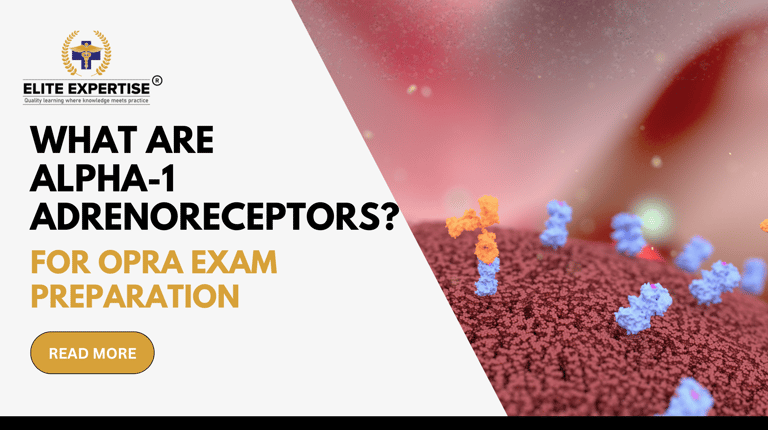ASK MY PHARMACIST | GOT QUESTIONS? Your pharmacist has answers. Click Here
What are alpha-1 adrenoreceptors: Core topics for OPRA Exam preparation 2025
Learn about Alpha-1 adrenoreceptors – location, effects, drugs, and clinical uses. A high-yield topic for OPRA Exam 2025 pharmacology preparation
Krupa
9/10/20253 min read


Key takeaways
Adrenergic receptors (alpha 1) are a group of receptors that are seen in various smooth tissues, including the brain, heart, kidney, and smooth muscles.
They are part of the fight-or-flight responses.
These alpha receptors mainly respond to epinephrine and norepinephrine
Two types of drugs will affect the alpha receptors: Alpha-1 stimulators (agonists), Alpha-1 blockers (antagonists)
For competitive exams like OPRA, understanding the pharmacology, mechanism of action, and clinical significance of alpha receptors plays a significant role
Alpha adrenergic receptors are primarily found in smooth tissues of the brain, heart, kidney, and visceral smooth muscles. Understanding the vital role of these receptors is very significant for healthcare professionals.
For competitive exams like OPRA, understanding pharmacology, the mechanism of action, and clinical significance plays a crucial role.
For the OPRA Exam, Pharmacology and therapeutics come under high-yield topics. Questions related to the mechanism of action, classification, and clinical relevance are often asked in exams like OPRA. The Overseas Pharmacists Readiness Assessment exam is a competitive examination that evaluates the core knowledge of overseas pharmacists in accordance with Australian standards. Such topics are crucial for pharmacists who work closely with patients, providing them with first-class care that is both safe and effective.
What are Alpha-adrenoreceptors?
Adrenergic receptors (alpha 1) are a group of receptors that are seen in various smooth tissues, including the brain, heart, kidney, and smooth muscles.
These come under the category of the sympathetic nervous system
They are part of the fight-or-flight responses.
Significant actions of these receptors are tissue contraction and cell cycle progression.
These alpha receptors mainly respond to epinephrine and norepinephrine (Cetecholamines).
The alpha-adrenergic antagonists produce arterial smooth muscle relaxation, vasodilation, and a reduction in blood pressure. Excessive vasodilation causes hypotension and can lead to reflex tachycardia.
They are G-protein-coupled receptors.
What is the location of Alpha-1 receptors?
They are mainly seen throughout the body. Especially in the smooth tissues of the brain, heart, kidney, and smooth muscles of the viscera
What are the physiological effects of alpha-1 receptors?
When these receptors get stimulated, they result in:
Cardiovascular effect: causes vasoconstriction, causes increased peripheral resistance in blood vessels, increasing BP
In eye: Causes pupil dilation (mydriasis)
It will trigger the sphincters in the urinary tract, causing them to contract, resulting in urinary retention.
It will increase the glycogenolysis in the liver, thus increasing the glucose level in the blood.
What is the clinical significance of Alpha-1 receptors?
Pharmacists need to know alpha-1 reactions because many drugs target them.
Causes Hypertension: Alpha-1 blockers lower BP by vasodilation
Used in Benign Prostatic Hyperplasia (BPH): Alpha-1 blockers relieve urinary symptoms
For Hypotension: Alpha-1 agonists act as vasopressors to raise BP.
In Ophthalmologic procedures, Agonists are used for pupil dilation.
There are some side effects also to be noted:
Side effects of alpha-1 blockers: postural hypotension, reflex tachycardia, and dizziness.
Side effects of alpha-1 agonists: hypertension, rebound congestion (nasal sprays).
What are the drugs acting on Alpha-1 adrenoreceptors?
Two types of drugs affect the alpha receptors. They are:
Alpha-1 stimulators (agonist)
Alpha-1 blockers (antagonists)
Alpha-1 stimulators - these drugs show the same effects as those of norepinephrine/epinephrine
Alpha-1 blockers - these drugs prevent norepinephrine from binding to its receptors, resulting in vasodilation or relaxation.
OPRA Exam preparation tips for core subjects
Candidates should expect some MCQs based on case study scenarios in the OPRA Exam.
Some examples are:
A patient with hypertension and BPH is prescribed a drug that blocks alpha-1 receptors. Which drug is most likely used?The answer is: Doxazosin
Which alpha-1 agonist is used in nasal sprays for congestion? Phenylephrine
What is the first-dose phenomenon? Severe postural hypotension after the first dose of prazosin
Conclusion:
For Candidates who prepare for the OPRA Exam, Alpha-1 adrenoreceptors are a core pharmacology concept to consider. It is an essential classification of drugs in hypertension, BPH, and ophthalmology. They have direct clinical uses for various purposes such as BPH, Hypertension, Hypotension, etc. A strong understanding of mechanisms, drug classes, and side effects is essential for students preparing for exams.


About the Author
Krupa Karamchand
Content Writer | Elite Expertise
Krupa Karamchand is a B. Pharm graduate and KAPS-qualified pharmacist with over 7 years of experience in the pharmaceutical field. As an experienced SEO content writer, she combines her in-depth healthcare knowledge with proven digital strategies to create informative, engaging, and search engine–optimized blogs. Krupa is passionate about making complex medical topics easy to understand and accessible to all readers.
Follow On
Follow Us
+91 76750 84909
Privacy Policy | © 2025 Elite Expertise . All Rights Reserved.
ELITE EXPERTISE PTY. LTD (ABN: 15668292439) (ACN: 668292439)
Australian Statutory Education License: OPP 2025 ELITE EXPERTISE PTY. LTD
Disclaimer
Elite Expertise is an online education platform dedicated solely to providing coaching and preparation services for the OPRA, PEBC, PSI and PTE exams. We do not offer any sponsorship or migration services. All information provided on our platform is for educational purposes only and should not be interpreted as legal or immigration advice. For inquiries regarding sponsorship, visa applications, or migration services, please consult with licensed immigration professionals or relevant authorities.
Elite Expertise is a trusted and results-driven training platform specializing in preparation for international pharmacist licensing exams. Our comprehensive courses, expert instructors, and proven methodologies have helped countless pharmacy professionals achieve their goals and succeed in competitive regulatory exams. We are proud of our strong success rate and commitment to excellence.
Elite Expertise is an independent training provider. We are not affiliated with any global pharmacy regulatory authorities or official exam-conducting bodies.
Copyright © 2026 Elite Expertise. All rights reserved.
Address
Unit 1/73 Beverley St, Doncaster East VIC 3109, Australia
